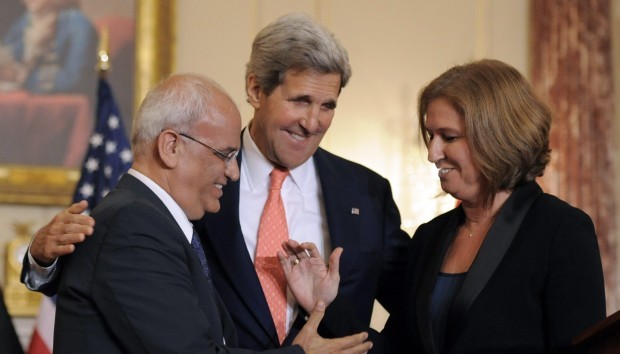It is nothing new for a fresh round of Palestinian–Israeli talks to be met with opposition from sides questioning its value. Both sides (those who are with and against the talks) give reasons based on their principles, political calculations or personal opinions.
Debate raged before this week’s meeting in Washington despite the fact that its main objective was to allow the Palestinians and the Israelis to discuss the detailed negotiations that will be held later.
Nevertheless, it can be said that the meeting represented an opportunity for president Barack Obama and his secretary of state John Kerry to show their determination to go ahead with the necessary procedures in order for the forthcoming negotiations to succeed the administrations of George H. W. Bush, Bill Clinton and George W. Bush failed.
This time, both objective and subjective circumstances provide Obama and Kerry with an opportunity.
As for Obama, who is not pursuing presidential elections, he is looking forward to more than the Nobel Peace Prize. In fact, he yearns to make history by doing the impossible. Kerry, on the other hand, will benefit if he decides to join the presidential race one more time. Establishing such a historical peace will add to his campaign record, particularly if he gains the broadest support possible from the pro-Israel lobby in the US.
It has been reported that the meeting in Washington concluded with the two sides agreeing to reach a permanent settlement within nine months.
This is a good thing. However, it would be better for us to anticipate potential obstacles. For example, I would not be surprised if Martin Indyk, the US envoy, was accused of bias. Such accusation is expected to come from the Palestinians. However, the Israelis may in turn hold Indyk responsible for hindering negotiations. In the past, such things happened with Dennis Ross, George Mitchell and Martin Indyk himself.
I am not denying anyone the right to question, nor am I in a position to defend Indyk or others. I have no personal relationship with any of them. However, like many others, I hope serious negotiations will take place without being suspended, particularly by the ones in charge of it, for reasons similar to the previous ones that have become boring over the time. Otherwise, negotiations would prove again fruitless, as skeptics reiterate. This will give credibility to the arguments of those who oppose any settlement that does not match their preconceptions.
In the same context, is it not possible that the actions of radical settlers may serve as a justification for the Palestinians to throw their hands up in despair, or vice versa?
Well, if that happens, we will enter into an endless whirlpool again. The word “whirlpool” leads me to believe that a simple antidote for the Palestinian–Israeli malady has been available for a long time.
Many would accuse me of naivety. In fact, I do not blame them. I will simply answer, “Let them say what they want to say.”
Logically, had the most senior figures in charge tried to solve an issue, even if all sides insisted on depicting it as impossible, they would have to. If it is necessary to ask since when a solution was possible, the answer will simply be: “Before the British Mandate of Palestine ended.” It was the moral duty of London not to leave Palestine before laying the foundations for peace, but this did not happen. After Palestine was divided in 1947, the Suez crisis happened in 1956 and followed by the 1967 Six-Day War, the Yom Kippur war in 1973, the Camp David accord in 1979, and so on. Many wars ended, only to leave burning embers for more devastating ones.
Why did this happen? Because none of the “seniors” wanted a solution. So far, this is the only serious answer available. To those wondering who these seniors are, I say they are none but the key decision makers around the world, senior Israeli and Palestinian leaders, and those who feared defending the Palestinian question would compromise their leadership.
Many are the ones who tampered with the Palestinian question and transformed it into a domain for settling scores and achieving gains to serve the agenda of a certain party, organization or leader.
Going back to the main point of this article, are we facing a new and serious case of negotiations? Maybe, but this won’t happen without pressure, as the famous saying goes: “You can take a horse to water but you cannot make it drink.”
Nevertheless, both Obama and Kerry can perform the role of the facilitator, even if they have to put pressure on both sides. Ironically, one is confused whether the Palestinian side has anything left to compromise. Good luck to President Obama and Secretary Kerry!

Trackbacks/Pingbacks